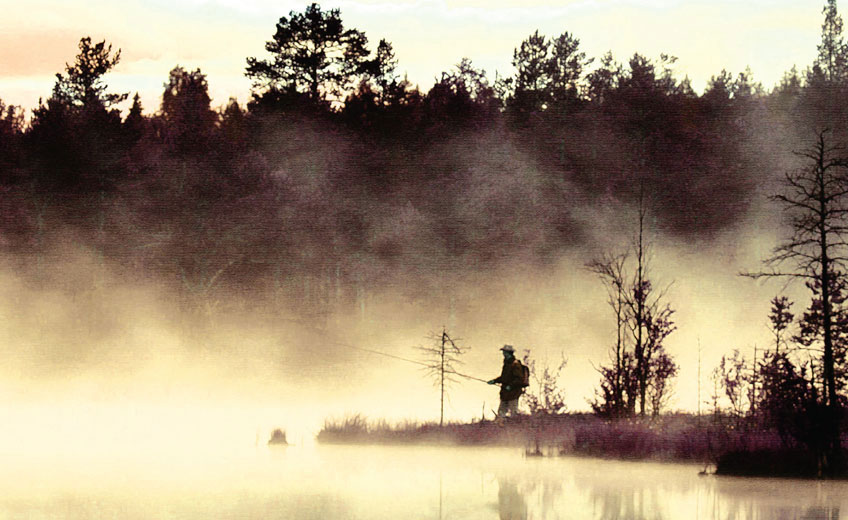Behind the rainy backdrop of the sunset hid an isolated house. It was at the edge of a grove not far from the main road. I looked at it sadly before pulling my car over at the base of the steps.
“I’ve got a fish for you,” I told the elderly lady who opened the door to greet me. She was a Thai teacher at Cornell University and a widow whose only son had left her to set up his own family.
“What a huge fish! I can’t finish it all.”
“Please take it; I’ve wanted to give one to you for so long. But due to my heavy workload, I hardly go outside. Today I got two fish and I want to share one with you.”
“You were caught in the rain alone?”
“Yeah, but that was fine. I enjoyed it.”
Rujira looked surprised and asked me about my fishing trip for a while. Soon afterwards I begged off to leave because I still had another fish to give away. The one I gave to Rujira was a big trout inhabiting the lake. Generally it is a deep water fish living in freezing water. It swims up to the surface only twice a year and we called it a lake trout. Unlike other trout species, lake trout do not seek food in creeks or streams.
It is the fish I tried to catch during the autumn of 1986 and spring of 1987. 1Almost every Thai student at Cornell University received my gifts of fish; some were sliced into pieces while some were cooked. Sometimes we arranged a meal together and steamed or deep-fried trout would be the main course.
Every time I gave people fish, I hoped my gesture of friendship would help warm the chilling weather in Ithaca, especially those who were lonely like Rujira…
For me, fishing for lake trout was a pleasure in itself.
As mentioned, lake trout are cold water fish, most of the year living at a depth of over 100 feet, or 30m, where temperatures are stable. Normally this trout is content at temperatures around 40 degrees Fahrenheit, or 4°C. It should not go above 12°C. If the surface temperature of the water is too high or low, the lake trout completely disappears from waters close to shore.
For this reason, the lake trout comes up to the shallow water only twice a year, in the early spring and late autumn. The former period is in the transition from April to May, and the latter from late October until November ends. The weather during these two periods is unpredictable.
One time the sky was clear as I cast the line into the water. But I had not even reeled in the lure before it suddenly got dark and started to rain. To the north I saw a picture of a grey sky connecting with the lake and rushing towards me. Within seconds I had the rod in my arms, grabbed the tackle box and rushed to find shelter from the rain.
Gasping for breath under a shed by the bank, I was astonished by the shifting scenery before my eyes. The grey curtain of sky rolled up as if a play was about to begin on a stage. Like magic, a curved rainbow appeared against the mountain range opposite me. Formed from ripples of the lake, the rainbow drew its colourful lines across the range and on the other side met the water again.
This was a rare scene during my hunts for lake trout, however. Most of the time I faced freezing winds blowing along my flesh like a knife blade or disappointment. This is because the lake trout are particularly active when the waves and wind are strong. When waves break into white foam we are more likely to catch the fish. The wind is effective at lowering the temperature.
While the weather in Ithaca might be around 10°C, the temperature where I was standing dropped to around the freezing point.
Amid these conditions, I usually stood and fished for three to six hours. Even though I wore a thick sweater and field jacket while my head and ears were hidden under a knitted beanie, my face and palms were bare.
Every time the wind blew, I felt like I was being licked by flames. The skin on the backs of my hands often cracked and bled, turning into red spider webs over my hands. There were many times I had to stuff my fists
into my mouth so my body heat could make them work again.
People could not understand why I called it a pleasure…
Being a doctorate student at Cornell was a life I had never expected. This experience took many things from me but also compensated through things I had not had before. Regarding the part I was robbed of, sometimes it gnawed on me until I nearly died.
One time I moved the piles of books surrounding me apart and grabbed a mirror to look through my face carefully … In front of me was a middle-aged man with deep wrinkles along frowning eyebrows. Eyes were dried like those of a dead fish, and the colour of the face was so lifeless and pale. I suddenly felt like he was a stranger. I did not know who he was, but looking into his condition I could tell he was withering away without
any clear purpose in life.
At the same time, it reminded me of another guy I was familiar with. I saw his sturdy body skirting through the jungle, gun snuggled beside him while his sparkling eyes scrutinized the scene. This picture totally contradicted the guy in the mirror.
I decided to fish for lake trout as a way to search for the missing parts of my life.
During the autumn, the lake trout in Keuka Lake, which was not so far from Cornell, would assemble to lay eggs at a cape named in Red Indian as Taughannock. Next to the cape was a creek of the same name running to Keuka Lake. It originated from the tallest waterfall in New York. This creek was an assembly point of the little fish that were the main food of the lake trout and other hunting fish. That is why this was a well known fishing spot in the area. The local authorities had turned neighbouring land into a public park. To facilitate the fishermen, they also built a nearby haven. At the cape, piers had been constructed and stretched towards both sides of the creek.
I first tried trout hunting in October 1986. At the time, the leaves were turning a glittering gold. The temperature was falling quickly but hadn’t yet hit its lowest point. I cast the lure for about two hours but could not catch a single fish. The failure was a result of the fact I could not recognize where the trout were. I tried to inspect the maps in fishing gear shops that indicated the water depth in each area. Then I calculated where the trout should be and cast my line out to the deepest point I could reach from the bank. Yet I failed. Not more than 50 metres away, however, an old man caught a 50cm trout. It encouraged me to keep trying.
For the second attempt I moved south and fished at the creek pond of Taughannock. The barometer was high that day; the fish tended to rise to the bait more actively than usual. I still used a spool and cast the rod for hours. The sky was clear but it was chilly, as the wind blew heavily the entire time. Beside me was a man who had come from a nearby town. He seemed quite talkative as he recommended fishing spots around Ithaca.
Actually I already knew them, but I smiled back and did not interrupt. This fishing companion could not catch anyfish either. At least I had someone to chat with and hide my loneliness.
After half a day I had still not caught anything, so I drove to another side of the pond to the north. An elderly couple were fishing there. As they saw me joining them, their faces turned sour. I cast the rod twice before
other people started arriving. That frustrated the couple. They walked away with an air of accusation that I had seized their place. I knew this and tried my best to sit humbly in the corner. They might have been upset
by the fact they could not catch any fish. I found that no one caught any lake trout that day.
I stopped fishing for a few days since thesis deadlines were coming quickly. I intended to finish the first chapter by the end of the month so I had to work day and night to complete it.
My project was delayed for four days. On the other hand, it went beyond my expectations as my first chapter was longer than 100 pages. So I could separate it into two parts … The first part concerned the Ayutthaya
Kingdom while the second part was involved with Thai education in the early Rattanakosin Era. I left my manuscript with my wife, as she had to run errands at the campus every day while I was arranging the tackle for
trout fishing.
Yet the next day the snow was falling for the first time of the winter so I was confined to home – randomly preparing spinners and jigs as well as oiling the reels. With regret I realized that fishing season would be over soon.
Fortunately the sky the next day was calm, scattered with clouds. The temperature rose to 10°C. Since the morning I observed the weather until it was in place at 2pm. I grabbed the rod and left home, hoping to catch the lake trout before the snow fell and the lake froze.
On the way to Taughannock Cape I dropped by a tackle shop and spent S2.50 on small fry. It was my first time using live bait in the past year. When I arrived, two people were fishing at the south of the pond so I headed to the north end which was still unoccupied. I hung the tiny live bait on the hook and threw the line into the water waiting for the lake trout to rise. While smoking, I saw trout and salmon jumping out of the water here and there.
In almost two hours not a single fish struck the line. An arm-long trout drove me crazy by swimming closely past. On the opposite bank I saw a guy catch a trout at 3pm. Notwithstanding the few that he missed, after a while he caught one more as big as the previous trout. Fishing beside him was an old, squat man who looked like a dwarf from Snow White. When the guy snared a fish, he would leave his rod and grab a huge net to scoop up the fish with. Lake trout weighed around 8 or 9 pounds, or 4kg. It might not be so clever to try to hoist it up by line. The trout would wriggle and throw its weight against the line until it snapped or the fish slipped off thehook and swam away.
I wondered what kind of lures the guy was using. Observed from a distance, his rod looked almost as light as an ultralight model. I could not tell what the bait was exactly but I could see it was an artificial one. He
dragged the lure particularly slowly. Drag and stop, drag and stop, like levelling the soil.
When the young man left, I gathered my gear and drove to the opposite side, asking the old man what bait the guy had used. The answer was tiny spinners. This made me remember a fishing theory that if the fish do not bite, reducing the size of the lure will help. This is because when the fish are not so eager to feed, a small line with small bait, slowly dragging the lure, will seem safer for the fish to bite. This was the truth today.
Story concludes in the next issue of Elite+.





















































































































































































































































































































































































































































































































































































































































































































































































































































































































